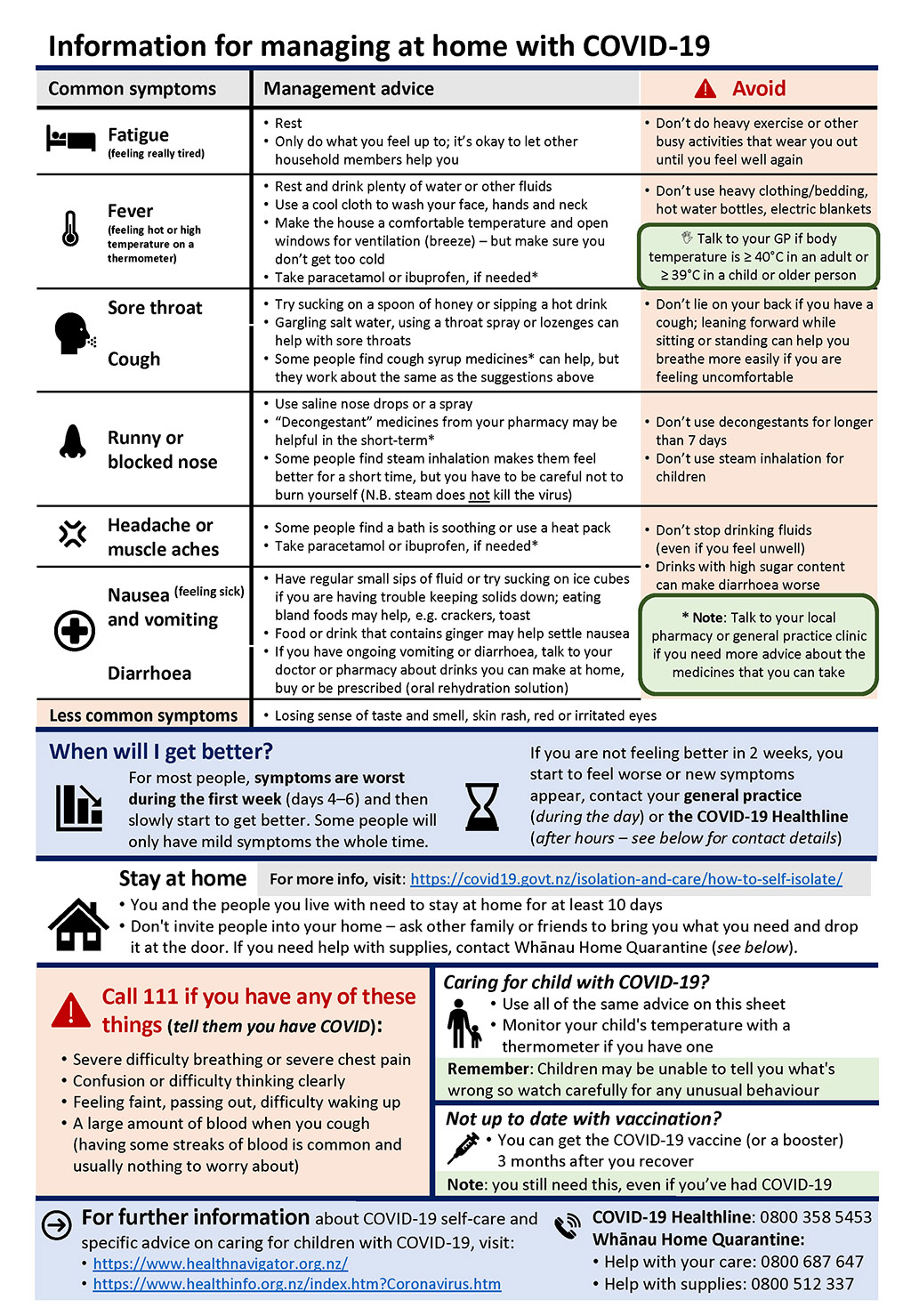COVID-19 positive patients with mild symptoms
What does self-management at home mean?
- Self-management means caring for yourself or your whanau at home, rather than needing any support or medication from your doctor
- If you need healthcare due to your symptoms, it will always be available for you. However most people will experience mild symptoms which can be treated with the usual treatments you might use for colds or seasonal flu
How should I treat symptoms at home?
- Using paracetamol can help with aches, pains and fever
- Honey or lozenges can help with a sore throat
- Decongestants can help with a blocked nose
- Make sure you keep hydrated by sipping water throughout the day.
- If you or your child has gastro symptoms, some other drinks can help, as long as you’re not dehydrated – apple juice (mix 1 part juice to 1 part water), cordial (make up to normal drinking strength then add 1 part water to 1 part of made up cordial), soup (add 1 part water to 1 part soup), fizzy drinks such as lemonade (add 1 part warm water to 1 part drink to remove the bubbles)
- Rest is important, sleep when you are tired
What should I do if my symptoms get worse?
- If you have difficulty breathing, at any stage of your illness, call 111 immediately. Tell them you have COVID-19 when you ring and they can provide you with the necessary support or health care
- If you are isolating at home and feel you are getting more unwell, call the COVID Healthline on 0800 358 5453 or give us a ring at the practice and one of our clinical team can talk to you about your symptoms over the phone
I am on other medication, should I continue to take it while I’ve got COVID-19?
- Yes, you should continue to take your medication as prescribed by your GP – don’t stop or reduce your dose unless your GP or nurse practitioner advises you to
- Do you have enough medication to last you the next few weeks? If you are running low we can help arrange a repeat prescription now to last you while you self-isolate
- It might be useful to set a reminder on your phone to take your medication on time if staying at home is a change to your usual routine
- Do you have an existing Sick Day plan? If so, please refer to this in the first instance, and if you’re in any doubt about what you should do then give the practice a call or contact your GP/NP through your Patient Portal
How can I prepare my whanau for self-isolating and caring for ourselves at home?
- There are some great resources on the Health Navigator website which can help with this. Type in www.healthnavigator.org.nz to visit the site
- Health Navigator contains health information and advice written by New Zealand health professionals such as GPs and Nurse Practitioners
- The website is free to use, which means you don’t need any credit or mobile data on your phone to be able to look through the information, download resources or watch their videos
- On the homepage there are links to lots of different pages relating to caring for yourself at home if you have COVID-19
I’ve been given a Rapid Antigen Test (RAT) but I don’t know how to use it
- You will also need to record your result on your My COVID Record account. You can do this online by logging in to your My COVID Record account, or by calling 0800 222 478
- Here is an email you a link to a video showing you how to record your RAT test result? (link to share – https://www.youtube.com/watch?v=yGifSro0rf4&t=3s )
How long will I need to self-isolate if I have COVID-19?
- You, and everyone else who lives in your house will need to isolate for 7 days from when your symptoms started, or from when you got tested and had a positive result (if you did not have any symptoms)
- Your household members will need to remain in isolation with you until your 7 days is complete and they need to test on Day 3 and Day 7
What if someone else in my household gets COVID from me while we’re all self-isolating – will the 7 days self-isolation period just keep extending?
- No, everyone in your household who gets COVID-19 will have their own 7 day isolation period
- If no one else in your household tests positive for COVID-19 on either day 3 or day 7 of your self-isolation period then everyone is able to leave self-isolation on Day 10
- If someone else in your household tests positive for COVID-19 during your self-isolation period then they will begin their own 7 day self-isolation period. Everyone else in the household that tests negative will be able to leave self-isolation when your 7 days is complete
- If you have already had COVID-19 your body’s natural immunity to the virus is very high, so you are unlikely to catch it again from another household member
What am I allowed to do while self-isolating?
- Unlike when we were in lockdown, you won’t be able to leave the house for anything other than receiving emergency health treatment
- Staying at home means there is less chance of you passing the virus on to anyone else
- This means you’ll need to arrange for food deliveries, and exercise just in your garden.
- I know it sounds difficult, but there are lots of resources available to help you plan for your time in isolation. I can email you through a link to Health Navigator which has some great videos and guides explaining what you can and can’t do, and how to make the time as easy for yourself and your whanau as possible. (Link to share) https://www.healthnavigator.org.nz/health-a-z/c/covid-19-positive-how-to-quarantine-at-home/
